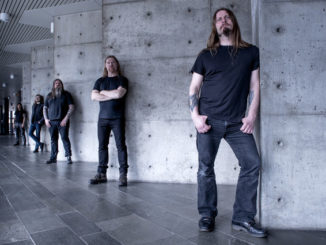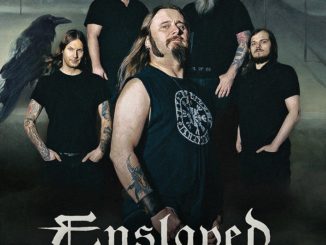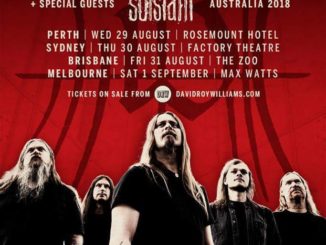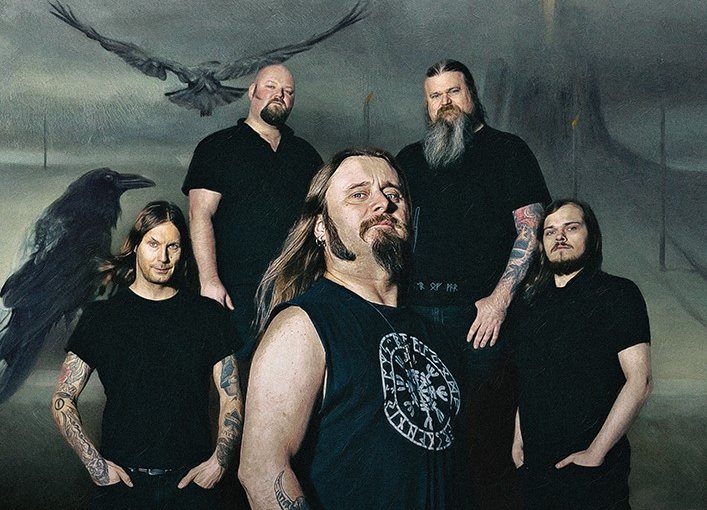
Norway’s premier progressive black metallers Enslaved release their new album “Utgard” on October 2nd and as they have been doing for a good portion of their career now that dates back to the early 90’s, the band shift further into their progressive sides with their latest release that culminates in one of their most diverse albums to date. We catch up with guitarist Ivar Bjørnson to find out more on the new songs and what inspires him the most these days.
Andrew: It’s a pleasure to speak to you again, we always talk every couple of years whenever you have a new album out. So I have to get the obligatory question out of the way, how have you been dealing with the pandemic the last few months?
Ivar: Well I think we’ve been really lucky. We have the entire album finished by the time the lockdowns started, most of the recordings of the videos were done, just editing left. We were able to do some live shows, live streaming so we’ve rehearsed more than we’ve ever done I think. Being in the band hanging out with those guys and working musically has really been a mental saviour during this time and staying at home for such a long time, for the first time since I was 18 has also been quite rewarding. I have kids now and they’re starting to recognise me when I come home so that’s a good thing.
Andrew: I understand that you originally were supposed to have the album come out earlier in the year but you had to postpone it obviously?
Ivar: Yeah it was just 4 or 5 months that we can’t complain about that. We’ve had people have tours cancelled and losing thousands of Euros so our little postponement was really nothing to complain about. Now is fantastic, we’re getting so many interviews happening every day, reviews pouring in. It’s really amazing to have all this attention that the album is getting, we are deeply honoured and humbled by that.
Andrew: I had the opportunity to listen to the album earlier today and outside of the singles I had previously heard, this album is probably some of the best pieces of work you guys have done and quite a varied diverse mix of songs as well. I guess you guys have always leaned towards the more progressive side of things and I think you really pushed the envelope so to speak on this one.
Ivar: There was so many things coming together on this one and now getting Håkon (Vinje, keyboards) who has worked with us for such a long time now, it’s his second album with Enslaved He’s coming from a more pure progressive background and then Iver (Sandøy) the drummer, a fantastic drummer who is not necessarily as influenced…it’s all about influences and he’s more influenced by more classic heavy metal and that made for a very cool and good balance having Ivar in as having one of his ambitions and wishes to explore more experimental territory just really accelerated that.
Andrew: Yeah I was going to ask how the new members have been fitting in with the band and obviously it’s worked out very well. There’s a lot of history there so it sounds like it was a fairly easy transition.
Ivar: Yes it has been quite easy, we are so incredibly lucky. Ivar we have known for ages, the first time we did a session job he was stepping in for Cato in 2006 because Cato had to go and fish some extremely rare tuna for 20 hours somewhere over the Atlantic. He had to go there and Ivar stepped in for him and he’s produced albums for us and everything. Hakon is just the most wonderful person ever, he’s probably the first guy to join the band that we didn’t know from before and that was just really lucky. But for us it’s the social element, it is as important as the musical element. To have that kind of audition where people come in and shred and then pick the best guy, ok that can work but it sounds awfully risky for us because you’re going on tour – when the world is not shut down of course – and stay in a bus for months and months and we discuss a lot about, not only like technical stuff, we discuss the philosophy behind what we are working for and towards and against and that’s quite intimate. It’s a sort of very personal philosophic level, being in a band with a bunch of guys I don’t feel close to, that just sounds weird.
Andrew: Do you think the philosophical aspect of the band and the chemistry infiltrate the music and the song writing process as well?
Ivar: Oh absolutely, I’m one hundred percent sure that it gives a meaning to it. I don’t think it’s in a pompous way, a sort of excluding way that we feel smart or anything like that, it’s just about the meaning is going through all of the elements, it’s not just the one person writing the lyrics that has that relationship. Everything, you’re sort of living the band and what it expresses and I think that gives us both pride and also a commitment to invest whatever we have each and everyone one of our resources. One of the things that I’m most proud about Enslaved is having these fantastic…I mean work, we’re all bulldozers there playing the bass and guitar like we’ve always done, we’ve learned our instruments through forming Enslaved. Sometimes I remember in the early days, write a new song and we would start working at it and then we had to postpone rehearsing it until we reached a technical level where we could play which is kind of comical now, but that sort of illustrates the ambition that’s been driving us.
Now we have Ice Dale (Arve Isdal), the lead guitarist and he can do all the stuff that I look at and go, ‘How did he arrive at this point where he can play that fast’. Håkon the same on keyboards coming from his progressive world, he can play. Look on a song like “Flight Of Thought And Memory” on the album, they are doing a double solo which is mindboggling. Iver, fantastic producer, drummer, singer, musical genius totally. So these guys could easily have been…you know the type where the lead guitarist is acting like he is entitled to 4 minutes in every song where he goes on to show his masturbation techniques to the world, and some people have that with the singer. But these guys, we’re playing with these guys and they’ll do a lead if it’s needed but everybody’s main concern is what does the song need, what can I do now to make all the other guys in the band sound good. It’s a fantastic attitude to have on that musical level, very grateful to be playing with them.
Andrew: Well it sounds like the band is in the best place it’s ever been in it’s history and the collaborative effort has really come through in the music. Going through the tracklist here, as I said it’s a very diverse tracklist, a lot of different kinds of songs in there. How long did it actually take to piece all this stuff together?
Ivar: Early November 2018 when I started writing it and the last bit was done pretty much around August 2019 so almost a full year.
Andrew: I guess it’s one of those questions that pops up for bands that have been around for quite some time, is that process of coming up with ideas and the songwriting craft becoming any easier as you get older or do you think it gets more difficult as time goes on?
Ivar: I think neither is the answer there. Some stuff you’re getting better at things, right, getting better at writing. Loads of times people would be, ‘How does a riff come about?’ Well it comes about when you get a certain sensation, a feeling. It’s like you’re hearing something that you’re not really hearing and you try to translate all that mumbo jumbo into a guitar riff which is basically what’s happening. But you also have to be aware of the traps that you’re setting up yourself which you don’t have when you are a brand new, hungry band. You don’t always think stuff, you just use your enthusiasm and sort of let things happen and I think that’s the key to keep being productive and let yourself be inspired. That’s the focus, not being worried about, ‘Is this going to sell’ or ‘ This is not going to sell’ or whatever, how the situation is going to be.
For me it’s been quite easy, I’ve built a bunch of businesses around what I’m doing so I’m working and own one third of a record label called By Norse Music, I’m part of a a management that manages other artists. I used to have a stage building company which of course went bankrupt this summer with the lovely covid which we are starting to build up a new one now. So I guess at this point with the Enslaved success the last 10 years I could of been doing pretty much just the band but I don’t want to be in that position, it’s the liberty that we’ve been given through fighting like hell to also keep a life outside of the band and I guess that makes it important like this pandemic also, that the band is everything but it shouldn’t be sort of your only thing, I think for me that is important. That makes me have a life outside of the band and that makes the experience and knowing things that gives me a bunch of inspiration to bring in and write the music.
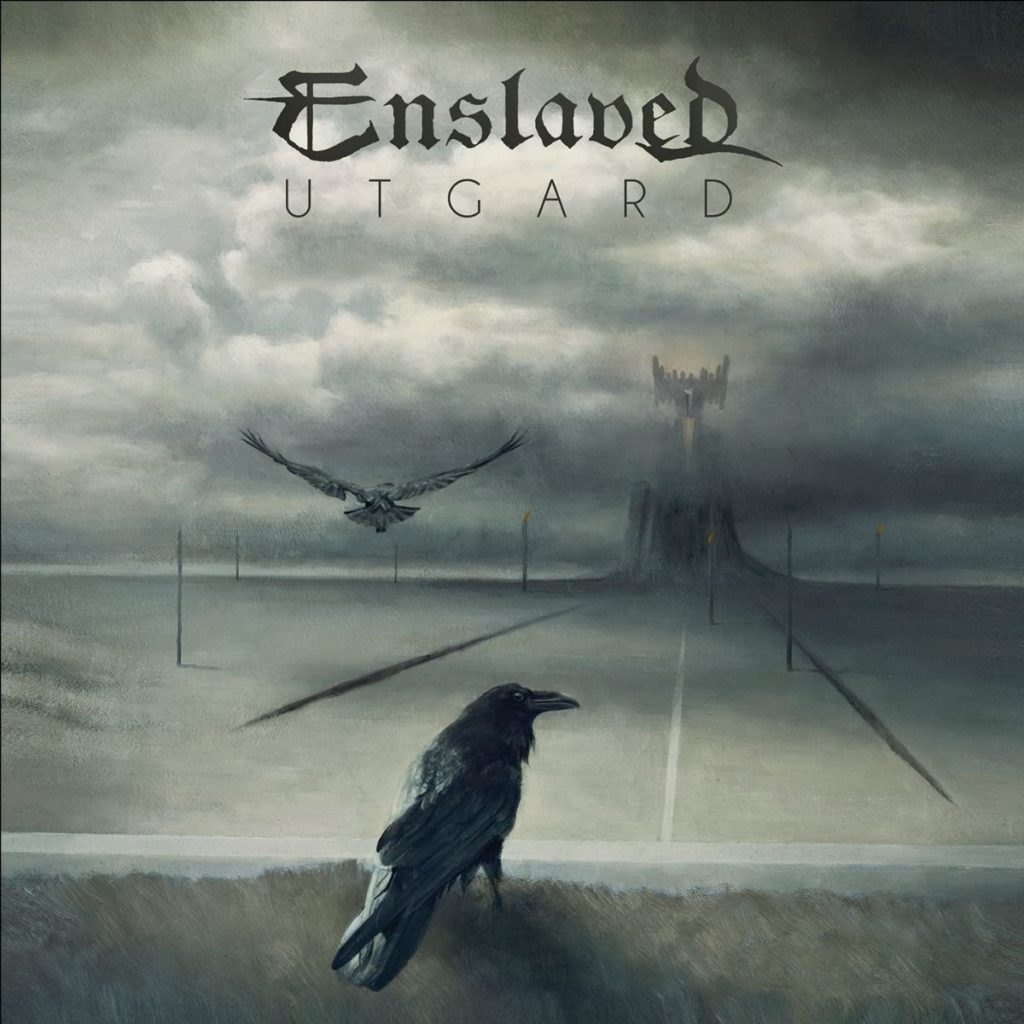
Andrew: What inspires you these days and has that changed as well over the years?
Ivar: It’s a bit of a paradox in a sense. I’m getting more inspired by other bands the older I get, when I was young I think that’s natural because you want to find your sound so I think it’s important to not be tempted to just take things directly and hear a fantastic riff and be tempted to just change it up a little bit and then use it for your own. I was very aware of that, that we had to find our own solution to things so it would be more about getting inspired by moods, getting a lot of that and trying to find that sort of working formula of being inspired by non-musical things and so on. But as time goes on, nowadays the Enslaved sound is so ingrained.
I remember when I wrote the song “Isa”, the title track from the Isa album, I was certain I had gone way to far in ripping off the main riff from Smashing Pumpkins’ “1979” song and when I told the guys in the rehearsal room, they thought I was drunk and it was discovered a few years later they all had taken it as a joke like I was trying to be sarcastic, like it was so far away from that riff. That told me, ‘I think we just reached that point where everything is being automatic translated into the Enslaved language’ and that gives a bunch of freedom. So I listen to new stuff, I havea lot of friends that give me recommendations. A lot of the times it will be new black metal trying to emulate Darkthrone from 1991 whch they fail horribly at every time and then there will be this fantastic band, like have you heard of the Swiss band Bolzer?
Andrew: Oh yeah.
Ivar: That’s mindblowing and I saw them appear at a bunch of the same festivals so I was making sure that I would be over there watching their show and that really inspired me, the way that we would be using in Enslaved like a sort of full instrumentation to build big sound walls while running around on one guitar while doing the vocals, that gave me a few thoughts. So they pop up some interesting bands all over the place so as I get older I’m trying to act less and less like an old scenster, like ‘Oh only the first Motorhead albums”, I don’t want to be that guy. Doing that consciously has also given me a bunch of inspiration.
Andrew: Yeah I love that mentality as well because as someone who loves music not just the old stuff but also a lot of new stuff, I think it’s important for bands to progress and evolve and I think Enslaved have done a lot of that over the years. You talked about in the early days trying to find your sound, was there a particular moment that you can remember where you considered finding that sound that represented Enslaved overall?
Ivar: It was very fluid, we did “Frost” which is quite close to the proto black metal sound, then we did “Eld” where a bunch of weird stuff happened, things like small progressive things sneaked in there. Then I guess we did a lineup change and with new guy became very oriented towards the black metal sound so I guess we went along with that but after that we felt we had to make…I remember me and Grutle (Kjellson, bass/vocals) talking about how we knew we wanted to continue what we were doing and go and explore the melodic side of the band also. We can do brutal stuff but we absolutely need to investigate this melodic and psychedelic, progressive sort of more dynamic expression. We were already getting a bunch of…not a lot but some people who are negative who always make themselves sound very loud so you get the impression that it’s a lot of people but now we know better. We did “Mardraum” and some people were coming up to us and saying, ‘I will never listen to Enslaved again’. Why? ‘Because what you did on “Mardraum” destroyed everything’. Destroyed what? Is there something that you like? And they’re like, ‘Yeah I loved the first album’. I said, ‘There you go, you shouldn’t stop listening to Enslaved, just make sure you listen to what you like and you’ll be a happier person’. So that went on for a little while so I think around “Mardraum” in 2000 we knew that we were going in a different direction and it’s been fun ever since.
Andrew: Yeah it has and this album does have a lot of great stuff. One of my favorite songs which is one of the singles released earlier this year is “Homebound”, it has a real melodic groove to it which I guess you’ve always had that groove aspect in your music but you really took the bull by the horns so to speak and went strong on that one. How did that song come about?
Ivar: On the surface I guess in the same way as the rest, me and an acoustic guitar in my living room and I guess it had a bit of a thrash moment when it came to Homebound that I really remembered. That’s how I started playing guitar, I was playing acoustic guitar with my Dad first at about 8 and then I got my first electric guitar at 10 and thrash metal was the big thing. I was playing Kreator and Anthrax and all kinds of stuff like that and I don’t know what it was but something brought me back and thought it was about time to get out and go all thrash hand and put a guitar with that and then with that sort of main idea forward the first two riffs sort of switch back and forth between. So a very American thrashy opening riff and then enter into a German thrash thing and then I felt we needed something more airy because the thrashy stuff, one of the things that’s cool is that it’s got this compressed feeling, almost a tight space kind of vibe to it. It’s tight and is sort of strangled in a sense and so it felt like it needed more open elements and that’s how all these verses came about that fit in perfectly with the singing. Very happy about it, very dynamic song I think that can get some people on to the ideas of Enslaved.
Andrew: Yeah absolutely and I guess when things open up again you’ll be itching to get out on the road again and play some of these songs live.
Ivar: Oh yeah we’ve done rehearsing, we’re doing these new songs, some of them at least on October 1st for the last stream on the Cinematic Summer Tour and we’re really looking forward to doing them live.
Andrew: Yeah we managed to catch you down here in Australia 2 years ago with Solstafir which was a pretty fun tour by the looks of it.
Ivar: Yeah it was great! Those guys are always great to be around anyway so when we had actually really good shows and a great time, it was perfect, good times. We are already longing to go back!
Andrew: [laughs] Yeah we don’t know when it will happen but maybe next year or something the borders will open up and we’ll get to see some touring again. Congratulations on the new album, it’s really great stuff and as I said maybe we’ll see you in Australia at some point in the future hopefully.
Ivar: I hope so too man.

